Women as changemakers for nutrition in the hills of Lao PDR
IFAD Asset Request Portlet
Asset Publisher
Women as changemakers for nutrition in the hills of Lao PDR
19 August 2020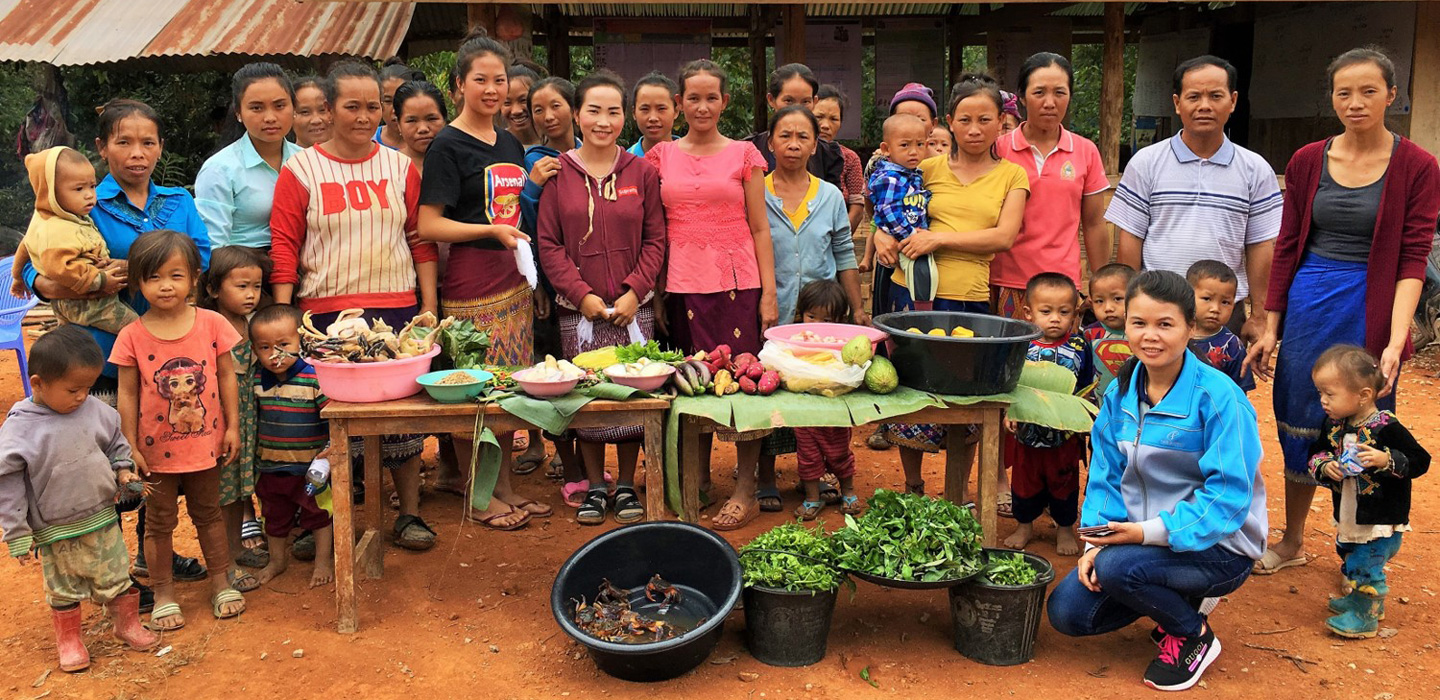
The rural uplands of the Lao People’s Democratic Republic are home to generations of proud family farmers. The vast majority of people living in this region depend on small-scale agriculture, with many still using traditional farming techniques handed down over the years.
Yet as the years go by, these practices have increasingly struggled to keep up. Declining soil fertility, combined with lack of access to newer technologies such as irrigation, have left many rural Lao farming a narrow range of traditional crops at barely a subsistence level. Many don’t have enough to eat, and those who do often lack nutritional variety in their diets. Moreover, the lack of surplus crop to sell prevents these farmers from fully participating in Lao PDR’s growing economy, leaving many families trapped in a cycle of intergenerational poverty.
The Agriculture for Nutrition Programme (AFN), a joint IFAD-WFP initiative funded by the Global Agriculture and Food Security Program, has been working alongside upland communities since 2016 to change all that. An essential part of the project is the Farmer Nutrition Schools (FNS) – and local women are essential to the schools’ success.
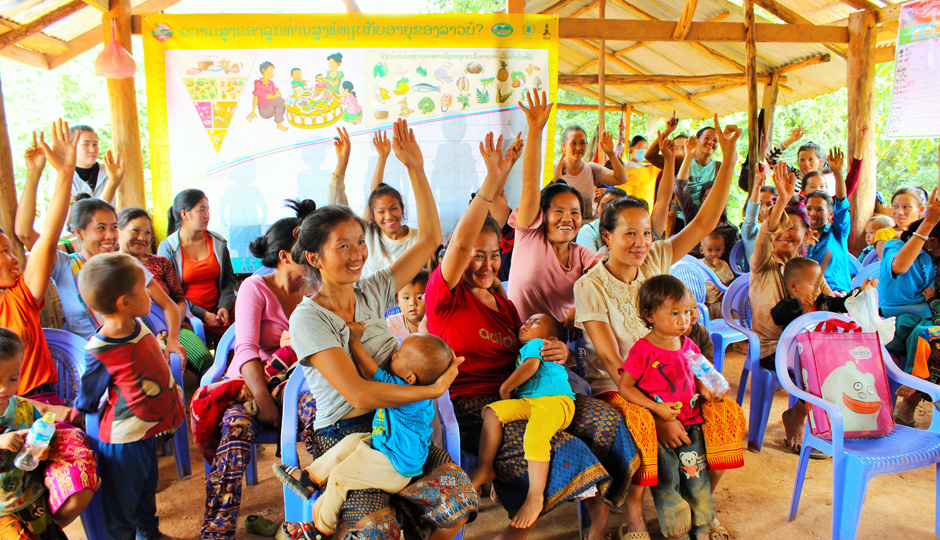 |
| FNS students answer questions during a group exercise, Namor district, Oudomxay province. |
Historically, rural Lao women and children have been disproportionately affected by their communities’ struggles with undernutrition and food security. In some provinces, rates of stunting among children under five years old are as high as 61 per cent. AFN project staff realized early on that focusing on women’s nutrition would be key to breaking the cycle.
In response, the FNS were designed to improve household diets by strengthening women’s knowledge of nutrition and agriculture and enhancing their ability to cultivate, preserve and prepare a variety of nutritious foods.
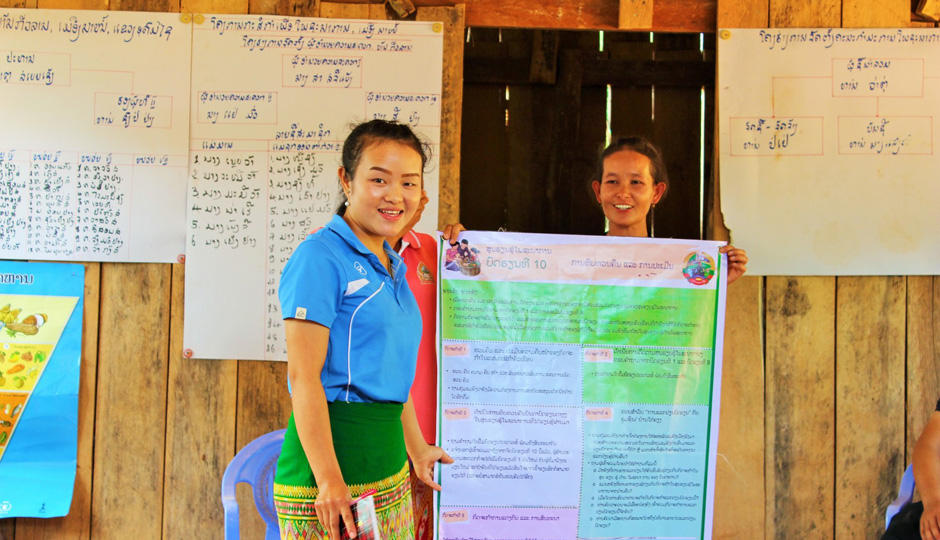 |
| A village facilitator conducts an FNS training session, Keolan village, Namor district, Oudomxay province. |
FNS are currently active in each of the project’s 400 target villages. Each school is supported by a team of three village facilitators – local volunteers who have been trained to teach the course material. Facilitators plan, publicize and deliver the course to their communities, usually with a WFP staff member on hand too.
After the completion of each course module, participants gather for cooking demonstrations and group discussions about household activities, the roles they and their family members play in the household, and the challenges they face.
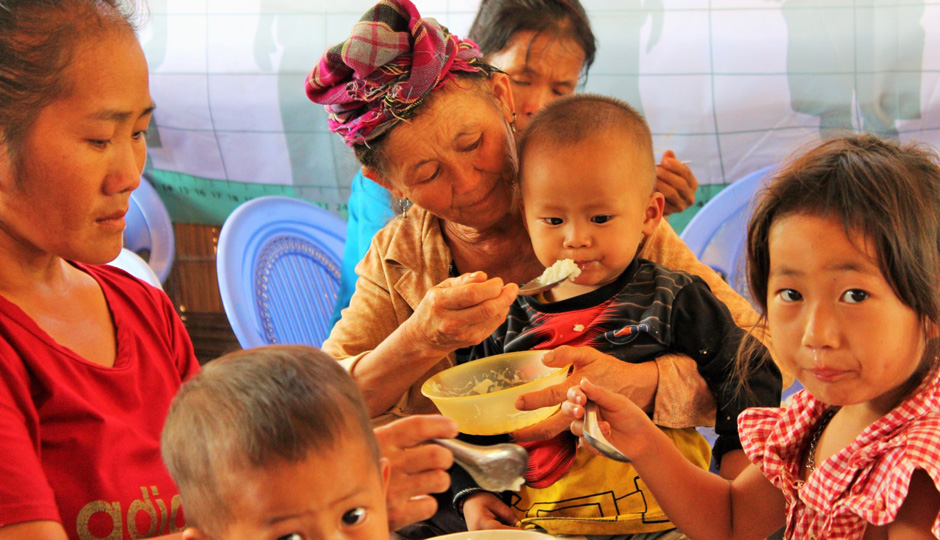 |
| A grandmother feeds her grandson a bowl of rice and meat porridge, Namor district, Oudomxay province. |
All are welcome at the FNS sessions – but as part of AFN’s strategy to break the intergenerational cycle, pregnant and nursing women are especially encouraged to attend. Elderly women, too, are essential participants, due to their cultural influence and status in the village.
Over the course of multiple training modules, FNS students learn about agro-biodiversity, raising small livestock, food processing and preservation, and managing income – all while acquiring crucial knowledge about nutrition and health.
“By joining this activity, I now know how to cook better, and most importantly I know what to cook,” says Mrs. Yuapave, a 25-year-old farmer from Phukea village. “Before, we were eating enough, but we were not eating right – and now, by eating right, I can see the changes in my children and my family.”
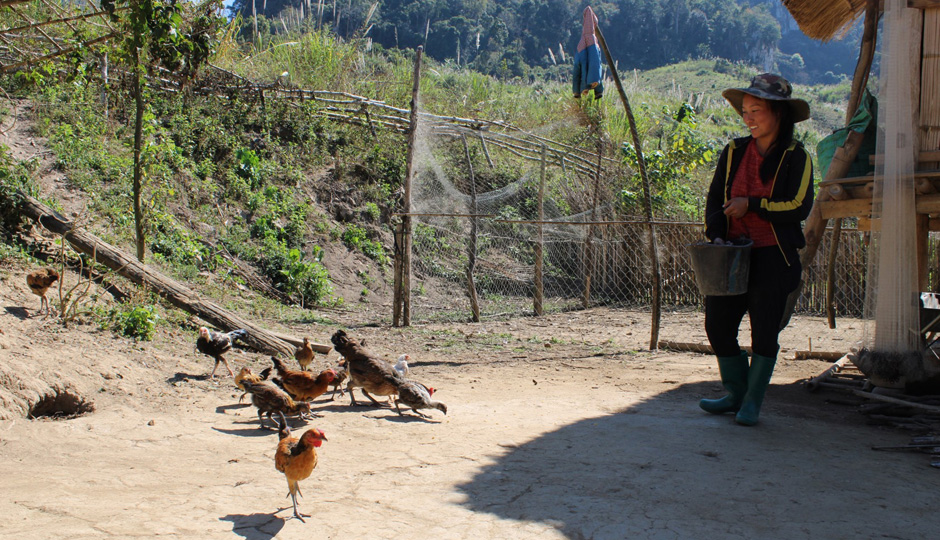 |
| Mrs. Sualao feeds her chickens, Nachak village, Namor district, Oudomxay province. |
Mrs. Sualao, a 22-year-old Hmong ethnic woman from Nachak village, is one of the many young women who have benefited from the programme. Before joining her village’s FNS, she had limited access to technical knowledge on nutrition and agriculture, and she struggled to keep her chicken and fish alive.
Along with sharing better techniques for raising fish and poultry, the FNS sessions taught her family how to prepare a diverse selection of nutrient-dense foods.
“I have noticed that, as a result of the training we get in FNS, people have started to plant various nutritious vegetables,” she says. “I see that the children are becoming smarter and taller, and as a community we do not get sick as often now.”
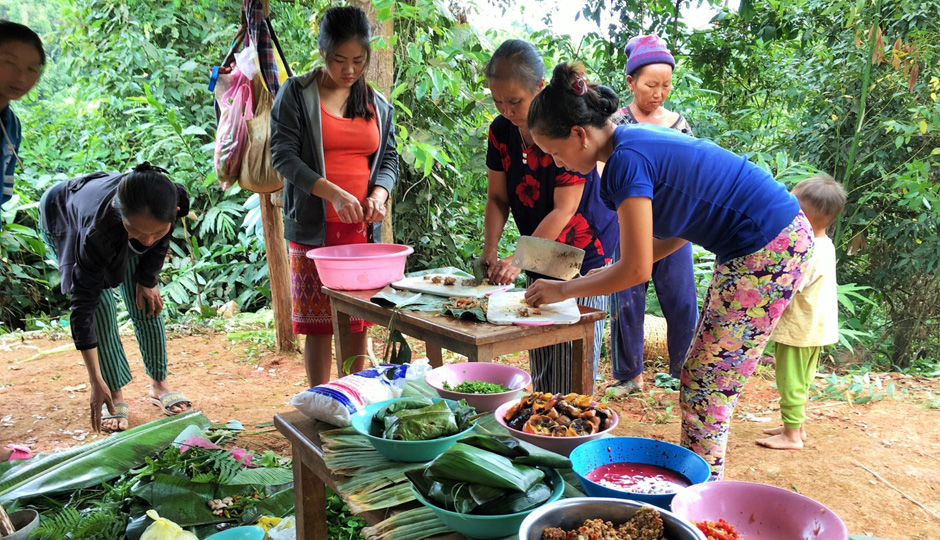 |
| FNS participants prepare to cook a meal together, Keolan village, Namor district, Oudomxay province. |
In addition to the trainings, the FNS also helps its students write proposals for grants from its parent AFN programme to start home gardens. Many are able to sell the surplus crop from these gardens, resulting in an additional source of income.
Mrs. Sualao was among the grant recipients. Instead of going straight for the home garden, she used hers to purchase 6 hens and 2 roosters. They’ve since multiplied into a flock of 20, collectively producing a steady supply of eggs. She keeps some for use in her home kitchen and sells the rest – and she’s since invested the income generated by her egg business into starting her home garden.
Thanks to her proactivity and fortitude, she is considered one of her village’s lead farmers, and many of her fellow FNS participants turn to her for advice.
“I never thought I could sell anything, I never had the confidence to negotiate,” she says. “But now I do all those things with confidence, and I earn a living for my family, along with feeding them an array of nutritious foods.”
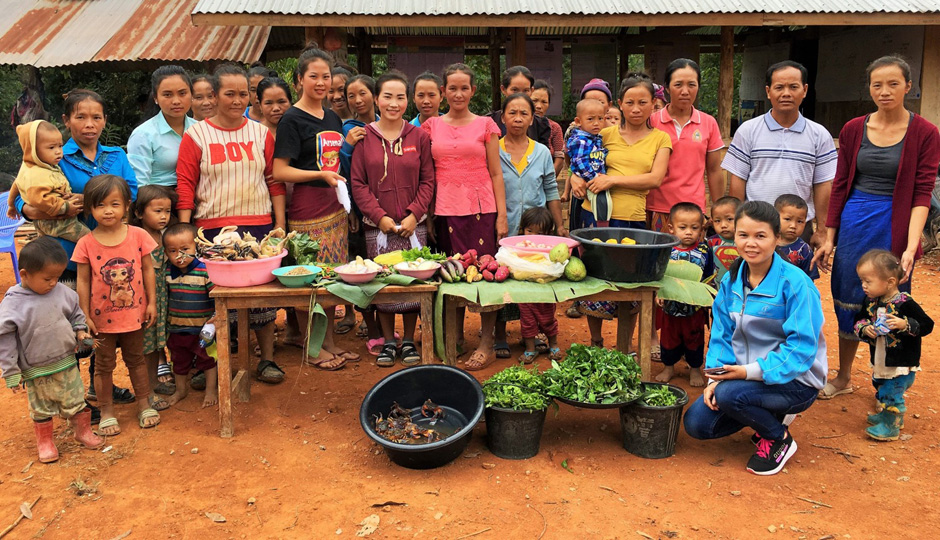 |
| FNS participants gather for a cooking demonstration, Keolan village, Namor district, Oudomxay province. |
To date, over 21,000 AFN project participants, 85 per cent of them women, have completed the FNS trainings, and over 12,500 have received grants. Each participant has also gained a space to voice their opinions and conduct business.
The impact of the Farmer Nutrition Schools shows not only in participants’ health and nutritional status, but also in the knowledge available to them – and in their incomes. To date, more than 3,700 families in AFN’s project area have transitioned out of poverty. Household dietary diversity has also significantly improved, resulting in an overall healthier population.
With two years left until project completion, hopes are high that, through smart agricultural practice and better nutritional knowledge, the participating communities will be able to overcome malnutrition and food insecurity – all while developing their small businesses and supporting their families.
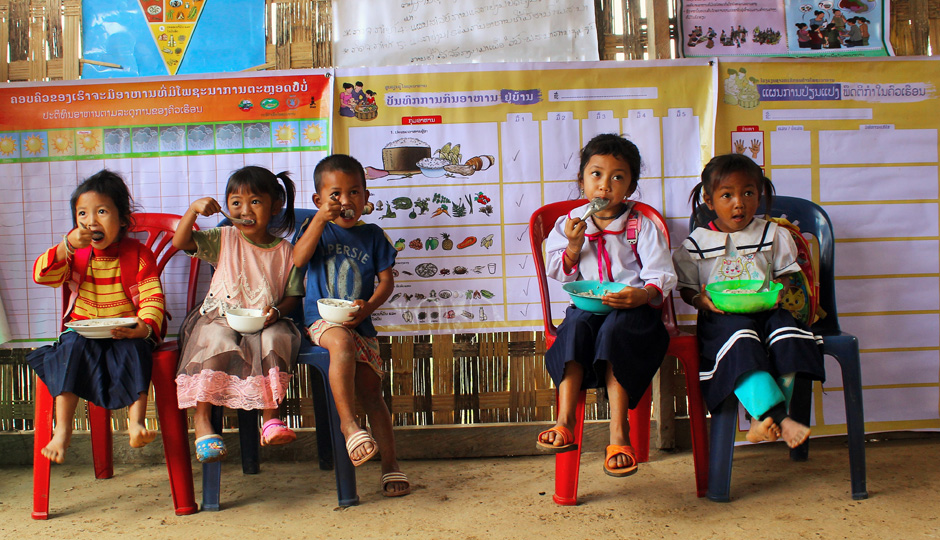 |
| Village kids enjoy a hot meal after an FNS training session, Keolan village, Namor district, Oudomxay province. |